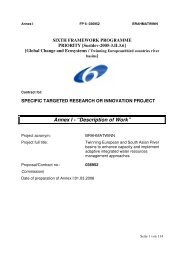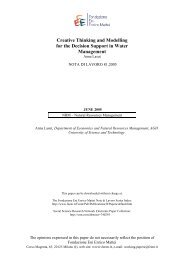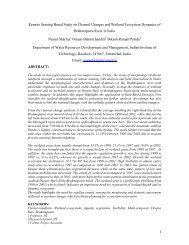WP 5 Analysis of present IWRM practices - Brahmatwinn
WP 5 Analysis of present IWRM practices - Brahmatwinn
WP 5 Analysis of present IWRM practices - Brahmatwinn
Create successful ePaper yourself
Turn your PDF publications into a flip-book with our unique Google optimized e-Paper software.
Another very important point is that the Policy recognizes the importance <strong>of</strong> addressing water<br />
management in a more holistic and integrated manner, and with the involvement <strong>of</strong> all stakeholders<br />
at all levels.<br />
Besides the widely accepted lack <strong>of</strong> human resources at dzongkhag and geog level, another problem<br />
is the shortage <strong>of</strong> water storage facilities. Campaigns and low level interest loans need to be<br />
undertaken to increase storage at household, community and urban level to ensure that sufficient<br />
water is available in future water short periods. Conflicts over water have been quite common in the<br />
past, and have occasionally been taken to court. In addition, especially in rural areas, the traditional<br />
systems <strong>of</strong> sharing water have <strong>of</strong>ten been inequitable, basing the sharing <strong>of</strong> water on such principles<br />
as “first there, first served” and “first in the queue is nearer the source”. In a rapidly developing<br />
nation with an increasingly mobile population, this issue needs to be addressed. The risk <strong>of</strong> conflict<br />
has been reduced by a clear <strong>present</strong>ation <strong>of</strong> priorities in the national water policy, and it is important<br />
that this is reiterated further in the final Water Act.<br />
Future problems which can be foreseen<br />
• Urban areas will continue to expand for the foreseeable future, and the demand for water will<br />
simultaneously increase.<br />
• In rural areas, and the smaller towns, aspirations are also increasing and this will also increase<br />
demand for water.<br />
• The number <strong>of</strong> tourists to Bhutan is likely to increase and this will add further strain to water<br />
supply systems, especially in the dry late winter and pre-monsoon season, when demand is high<br />
from farmers and the hydropower sector. This may also result in the drying up <strong>of</strong> springs during<br />
this period.<br />
• There is thus a clear need for a concerted campaign to encourage water conservation and storage<br />
at all levels in both urban and rural situations.<br />
In all the above aspects, knowledge and preparation is the key, and great efforts are needed in<br />
provision <strong>of</strong> public awareness campaigns, training and education at all levels, including schools,<br />
community groups, and government staff. National Environment Commission and Department <strong>of</strong><br />
Management Development will bear much <strong>of</strong> the burden for this, though assistance from all<br />
concerned Ministries and departments is vital. Behind the campaigns will be the basic premise that a<br />
proper value must be placed on the supply <strong>of</strong> water, and that, unlike in the past, it may not always be<br />
free and plentiful. In addition, proper charges for water must deter waste, and ensure a sustainable<br />
future supply, and a system <strong>of</strong> PES established so that, for example, individuals, schools, adult<br />
literacy groups and communities, undertaking good works which will conserve water and the<br />
environment, are compensated for their efforts and encouraged to undertake further such tasks.<br />
Need for <strong>IWRM</strong><br />
Recognizing that water is a finite resource, that competition for water is increasing in Bhutan, and<br />
that climate change may have adverse effects on future water availability, some form <strong>of</strong> <strong>IWRM</strong><br />
system can help the nation in managing its water resources to the benefit <strong>of</strong> all, in the following<br />
ways:<br />
a) to dissolve the fragmented management <strong>of</strong> water resources in Bhutan, and build links and<br />
bridges between all the sectors using water and currently responsible for its distribution,<br />
28





